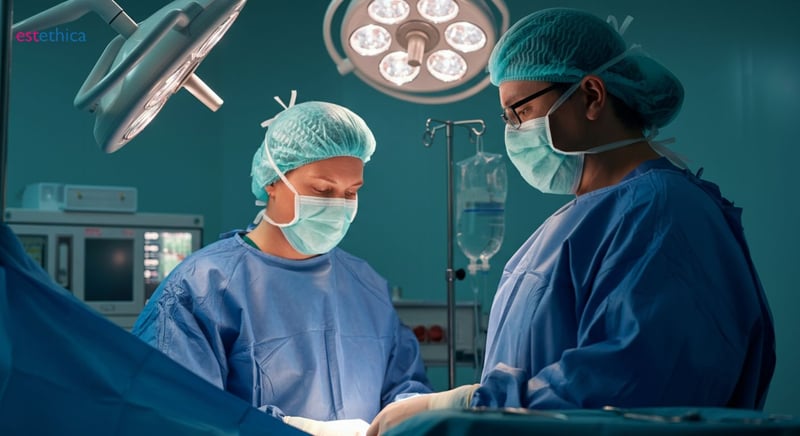Unlocking the Secrets of Stomach Surgery: A Comprehensive Guide
Explore cutting-edge stomach surgery at estethica for safe, effective weight loss.
Stomach surgery has emerged as a promising solution for individuals struggling with obesity and seeking effective weight loss. This comprehensive guide aims to unlock the secrets of stomach surgery, providing insights into the various types available, their mechanisms, safety considerations, and the latest innovations in this field. At estethica, the mission is to prioritize health, safety, and ethically sound practices, which are reflected in their state-of-the-art procedures and exceptional patient care. Join us as we delve into the transformative journey of stomach surgery.
What You Need to Know About Stomach Surgery Options
Understanding Different Stomach Surgery Techniques
Stomach surgeries, often recommended for individuals battling severe obesity, encompass a range of techniques tailored to facilitate weight loss. Options include gastric bypass, mini gastric bypass, stomach banding, and sleeve gastrectomy. Each procedure uniquely alters the digestive system to curb appetite and reduce calorie absorption. For example, gastric bypass reroutes the small intestine to a stomach pouch, minimizing food intake. Meanwhile, the sleeve gastrectomy involves removing a portion of the stomach, thus reducing its capacity significantly. Patients must undergo thorough evaluations to determine the most suitable surgery that aligns with their medical profiles and weight loss goals.
Key Benefits of Stomach Surgery
- Significant weight loss: Many patients experience substantial weight reduction, improving overall health.
- Improved metabolic conditions: Surgeries can lead to better management of diabetes and hypertension.
- Enhanced quality of life: Patients often report increased mobility and energy levels post-surgery.
These benefits highlight the potential positive impact of stomach surgeries on long-term health and lifestyle.
Steps in the Gastric Surgery Process
- Initial Consultation: Patients discuss their health history and goals with a specialist.
- Pre-Surgery Evaluation: Comprehensive tests ensure the patient is fit for surgery.
- Post-Surgery Care: Follow-up appointments and lifestyle adjustments support recovery.
Understanding these steps helps patients prepare for the journey and achieve optimal outcomes.

Understanding How Gastric Surgery Works for Weight Loss
Mechanisms Behind Gastric Surgery's Effectiveness
Gastric surgery, a pivotal tool in combating obesity, primarily functions by altering the stomach's size and digestive pathways. This modification restricts food intake, leading to quicker satiety. For instance, a sleeve gastrectomy reduces the stomach to a banana-shaped pouch, significantly limiting food capacity. Additionally, surgeries like gastric bypass reroute the digestive tract, affecting nutrient absorption and hormonal signals that regulate hunger.
Key Factors Influencing Weight Loss Success
- Post-surgery lifestyle changes: Adopting healthy eating habits and regular exercise is crucial.
- Psychological support: Counseling can help address emotional eating and maintain motivation.
- Regular medical follow-ups: Monitoring progress ensures any complications are promptly addressed.
These factors collectively enhance the long-term success of weight loss surgery, ensuring sustained results.
- Initial Reduction: The stomach's reduced size limits food intake.
- Hormonal Changes: Altered gut hormones decrease appetite and improve satiety.
- Metabolic Adjustments: Changes in digestion and absorption aid in weight loss.
Understanding these mechanisms helps patients appreciate the comprehensive impact of gastric surgery on weight management.

Is Weight Loss Surgery Safe? Key Insights for Patients
Ensuring Safety in Weight Loss Surgery
Weight loss surgery, including gastric and stomach surgeries, has evolved significantly, prioritizing patient safety through advanced techniques. Minimally invasive procedures, such as laparoscopic surgery, have reduced risks and shortened recovery times. For instance, laparoscopic gastric bypass involves small incisions, minimizing infection risks and promoting quicker healing. Furthermore, comprehensive pre-operative screenings at facilities like estethica ensure that patients are well-prepared for surgery, reducing potential complications.
Comprehensive Post-Operative Care
- Dietary Guidance: Tailored nutrition plans support healing and long-term weight management.
- Routine Follow-Ups: Regular check-ups help monitor recovery and address any issues promptly.
- Support Systems: Access to support groups and counseling aids emotional and psychological well-being.
These elements are crucial in ensuring a smooth recovery and enhancing the overall success of weight loss surgery.
- Pre-Surgery Assessment: Evaluations determine patient suitability and identify potential risks.
- Surgical Procedure: Conducted with precision to minimize complications and ensure effectiveness.
- Post-Surgery Monitoring: Continuous observation to ensure recovery is on track and complications are managed.
Understanding these safety measures helps patients make informed decisions about undergoing weight loss surgery.

Latest Innovations in Gastric Surgery: What to Expect
Advancements in Surgical Techniques
Recent advancements in gastric surgery have significantly enhanced the precision and safety of procedures. Laparoscopic and robotic-assisted surgeries are at the forefront, offering surgeons greater control with minimal invasiveness. These techniques involve smaller incisions, which not only reduce the risk of infection but also promote faster recovery times. For instance, robotic-assisted surgery provides a 3D view and precise movements, allowing for meticulous operations that were previously challenging. Additionally, the integration of sophisticated imaging technologies aids in accurate diagnosis and planning, ensuring personalized treatment plans tailored to individual patient needs.
Benefits of Cutting-Edge Technologies
- Enhanced Precision: Robotic systems enable surgeons to perform complex procedures with high accuracy.
- Reduced Recovery Time: Minimally invasive techniques lead to quicker healing and less postoperative pain.
- Lower Complication Rates: Smaller incisions decrease the likelihood of infections and other complications.
These benefits highlight the transformative impact of technology on gastric surgery, offering patients improved outcomes and experiences.
- Pre-Operative Imaging: Advanced imaging techniques provide detailed insights for surgical planning.
- Surgical Execution: Robotic and laparoscopic tools enhance precision during the procedure.
- Post-Operative Monitoring: Continuous advancements in monitoring technology ensure effective recovery.
Understanding these innovations empowers patients to make informed decisions about their surgical options, ensuring they receive the best possible care tailored to their needs.
Innovative Gastric Surgery Techniques with Enhanced Precision
Excellence in Gastric Surgery: Ensuring Optimal Outcomes
Frequently Asked Questions
What is stomach surgery and how does it aid in weight loss?
What are the key benefits of undergoing weight loss surgery?
Is weight loss surgery safe, and what measures are taken to ensure patient safety?
What are the latest innovations in gastric surgery?
What factors influence the success of weight loss surgery?
Discover the Art of Healthy Beauty with estethica! Call now for your free consultation and take the first step towards a more confident you.
📞 Call Us Today for Expert Advice